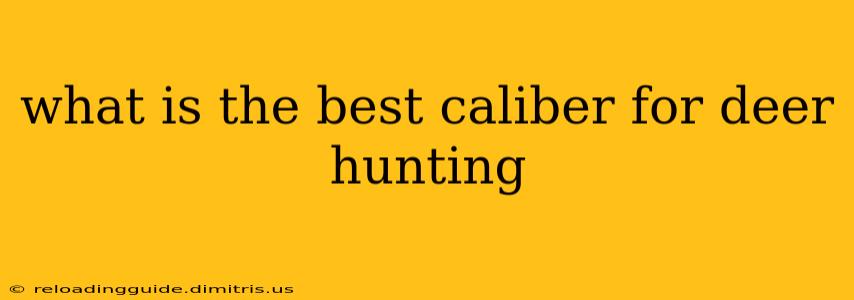Choosing the right caliber for deer hunting is a crucial decision impacting your success and ethical hunting practices. There's no single "best" caliber, as the ideal choice depends on several factors, including hunting style, range, terrain, and personal preference. This guide will delve into the key considerations and popular calibers to help you make an informed decision.
Factors to Consider When Choosing a Deer Hunting Caliber
Before jumping into specific calibers, let's examine the crucial factors influencing your choice:
1. Hunting Style and Range:
- Stand Hunting: If you primarily stand hunt, you might prefer a caliber with flatter trajectory and longer range, allowing for accurate shots at greater distances.
- Spot and Stalk Hunting: For closer-range shots in dense cover, a shorter-range, less powerful caliber might suffice, prioritizing maneuverability and shot placement.
- Driving Hunts: Similar to spot and stalk, driving hunts often involve quicker, closer shots, making a manageable recoil and easy-to-handle rifle important.
2. Terrain:
- Open Fields: Longer-range calibers are beneficial in open fields where shots can extend further.
- Dense Woods: Maneuverability and shot placement are paramount in dense woods, favoring shorter, lighter rifles chambered in less powerful calibers.
3. Personal Preference and Experience:
- Recoil Sensitivity: Consider your tolerance for recoil. More powerful calibers generate significant recoil, potentially affecting accuracy and comfort, especially for less experienced hunters.
- Physical Capabilities: Choose a rifle and caliber that you can comfortably handle and carry for extended periods, particularly during long hunts.
4. Ethical Hunting Practices:
- Shot Placement: Regardless of caliber, ethical hunting demands precise shot placement to ensure a quick, humane kill. A powerful caliber doesn't guarantee a clean kill if the shot is poorly placed. Practice is key!
- Overpenetration: Consider the potential for overpenetration, especially in densely populated areas. A caliber that delivers sufficient stopping power without excessive penetration is ideal.
Popular Calibers for Deer Hunting:
Here's a breakdown of some of the most popular calibers used for deer hunting, categorized by their characteristics:
Mid-Range Calibers (Excellent Balance of Power and Maneuverability):
- .308 Winchester: A versatile and popular choice, offering a good balance of power, accuracy, and manageable recoil. Suitable for various hunting styles and ranges.
- .30-06 Springfield: A classic and powerful cartridge, offering excellent range and stopping power. However, it has more recoil than the .308.
- 7mm-08 Remington: A slightly less powerful but equally accurate option than the .308, offering reduced recoil, making it a good choice for beginners or those sensitive to recoil.
- .270 Winchester: Known for its flat trajectory and accuracy at longer ranges, this caliber is a favorite among many deer hunters.
Larger Calibers (More Powerful, but with Greater Recoil):
- .300 Winchester Magnum: A powerful magnum cartridge delivering exceptional range and stopping power. However, it has significant recoil, requiring a sturdy rifle and experienced handling.
- 7mm Remington Magnum: Another powerful magnum cartridge, offering similar performance to the .300 Winchester Magnum but with potentially less recoil for some shooters.
Smaller Calibers (Suitable for Closer Ranges and Specific Situations):
- .243 Winchester: A lighter-recoiling cartridge suitable for deer hunting at shorter ranges. It is often preferred for smaller deer or in situations where shot placement is critical due to dense cover.
- 6.5 Creedmoor: A modern cartridge gaining popularity, offering excellent accuracy, less recoil than many other calibers, and good stopping power at moderate ranges.
Conclusion:
The "best" caliber for deer hunting depends entirely on your individual needs and circumstances. Consider your hunting style, range, terrain, personal comfort level with recoil, and ethical hunting practices. Research the various calibers discussed, practice extensively with your chosen firearm, and always prioritize safe and ethical hunting practices. Consulting with experienced hunters and firearm professionals can also provide valuable insights.

